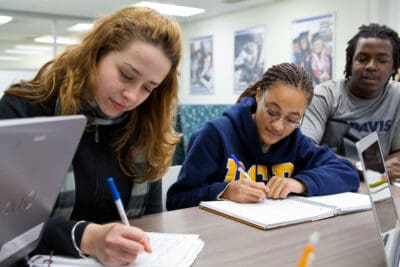
Ascendium Grant Propels Phase II of JFF’s SSCN Coaching Program
October 27, 2020
By Jenn Giffels and Amy Girardi
As parallel health, economic, and equity crises underscore the critical role community colleges can play as backbones of their communities, JFF is investing deeply to continue our efforts to help all learners and workers achieve greater success at community colleges.
Specifically, we are thrilled to announce that we launched Phase II of our Student Success Center Network (SSCN) Coaching Program late this summer with the support of a $1.3 million grant from the Ascendium Education Group. As we discussed in our previous blog, since 2017, we’ve believed and invested in this work as a driving lever of reform at community colleges. We’re proud to be leading in the field with our key partners and the Student Success Centers (SSC) in the development of coaching as a key strategy to advance evidence-based student success reforms.
These reforms have never been more important or timely. As partner Katie Kovacich, research project manager at Community College Research Initiatives, explains, “Institutions throughout the country are going through changes, some planned and many unplanned, due to the global pandemic and a renewed fight for racial justice. State-based coaching networks have the potential to play a crucial role in creating transformational change during these tumultuous times.”
State-based coaching networks have the potential to play a crucial role in creating transformational change during these tumultuous times.
Katie Kovacich, Research Project Manager, Community College Research Initiatives
Two Strands of Work
Aiming to propel evidence-based reforms on campuses across the Network and ultimately increase students’ success and economic mobility, the SSCN Coaching Program knits together two parallel strands of work: capacity-building and strategic technical assistance to help Student Success Centers build out their coaching programs, and training and ongoing professional development for coaches.
That dual approach yielded these core initiatives:
- From 2018 to 2019, JFF partnered with Achieving the Dream (ATD) to run a yearlong curriculum to train a cohort of nearly 50 people as institutional coaches, focusing on change management and guided pathways. With the new resources available for Phase II, we are able to continue our partnership with ATD and provide quarterly professional development and continued community-building among this cohort of coaches. “We’re very pleased to see the continuation of the training program for the SSC coaches,” says ATD Chief Learning Officer Susan Mayer. “It’s clear from the contributions of the first cohort of coaches in supporting colleges to increase their focus on equitable student outcomes that the training was high value-add.”
- JFF invested in five SSCs during Phase I of this work (and in 10 SSCs for a pilot phase prior to that); read our previous blog for an example of an SSC’s coaching program. For Phase II, JFF is able to invest $440,000 in four Centers to support the evolution of their state-based coaching programs. JFF is continuing our partnership with Community College Research Initiatives (CCRI) to provide strategic advising and facilitate a community of practice for these four Centers.
We’re very pleased to see the continuation of the training program for the SSC coaches. It’s clear from the contributions of the first cohort of coaches in supporting colleges to increase their focus on equitable student outcomes that the training was high value-add.
Susan Mayer, Chief Learning Officer, Achieving the Dream
Doubling Down on Data
For Phase II, JFF is excited to double down on data. We are drafting theories of change with each of our grantee SSCs—and for the program overall—and creating optimistic yet realistic work plans that include assessment metrics. Because coaching is so versatile, it is important to get specific with the changes—both short- and long-term—that colleges and states want to see as a result of the coaching engagements.
We’ve already started grappling with critical design questions such as these: How do you best make the relational matches between coach and college? How do you thoughtfully roll out coaching across your state: Do you start deeper with a subset of colleges, or at a higher level for all colleges? And, how do you manage demand and expectations for coaching?
As always, JFF shares the work and lessons learned with the entire 16-state SSC Network and its partners. We created a Toolbox for coaches and SSCs, filled with guidance, suggestions, and prompting questions to help coaches, colleges, and Centers in their work. While JFF lifts up common themes from across our coaching work, we simultaneously help states and colleges contextualize their approaches to reflect their specific needs.
Our SSC coach community recently engaged with two professional development sessions on how to coach effectively in this virtual environment that has become the new norm. Coaches—new and experienced alike—are asking these key questions: How do we do this equitably? How do we work with colleges to ensure that marginalized voices—those of both employees and students—are heard, and that their ideas are acted upon? And how do we ensure that solutions proposed follow universal design principles, rather than simply tweak dominant structures that don’t serve all students?
While we don’t believe coaching is the answer to everything (or maybe we do. . .), we have seen indicators that coaches can help colleges move the needle on key evidence-based student success reforms, in part by being trusted guides that colleges can turn to for honest feedback, problem-solving, facilitation, and learning. Coaches also are critical connectors between colleges and state-level actors (like the SSC), helping to share information across all levels for better decision-making all around.
Coaches Can Help
The start of this academic year brings sharpened focus and renewed attention to the importance of colleges because it’s an opportunity not only to welcome all types of students, wherever they are in their learning journeys, but also to follow through on their promise of helping students achieve upward economic mobility. Coaching can help community colleges get there.
We encourage stakeholders across the postsecondary ecosystem to be in touch with JFF as we continue our coaching journey. We’d love to help you think about coaching, and we’d love to learn from what you’ve done.

Student Success Center Network (SSCN)
This national network scales proven practices to help more than 4.5 million students earn credentials that lead to well paying jobs. Nearly half of U.S. community colleges are connected to the Student Success Center Network.…

Postsecondary Network
Reforming math in Florida, ensuring equity in Washington, boosting student support in Michigan, partnering with the workforce system in New Jersey—JFF’s renowned network advances policies and practices that help all students attain high-value credentials. Reforming…

JFF Invests in Coaching to Help Colleges and States Carry Out Systemic Change
February 26, 2019
How Ohio Community Colleges Use ROI to Make the Most of Student Success
Mapping a PathForward: Lessons Learned Colleges are receptive to ROI concepts but identifying initiatives can be challenging. Colleges examined ROI across a variety of student success initiatives, including a redesigned advising model, a cohort-based intensive…